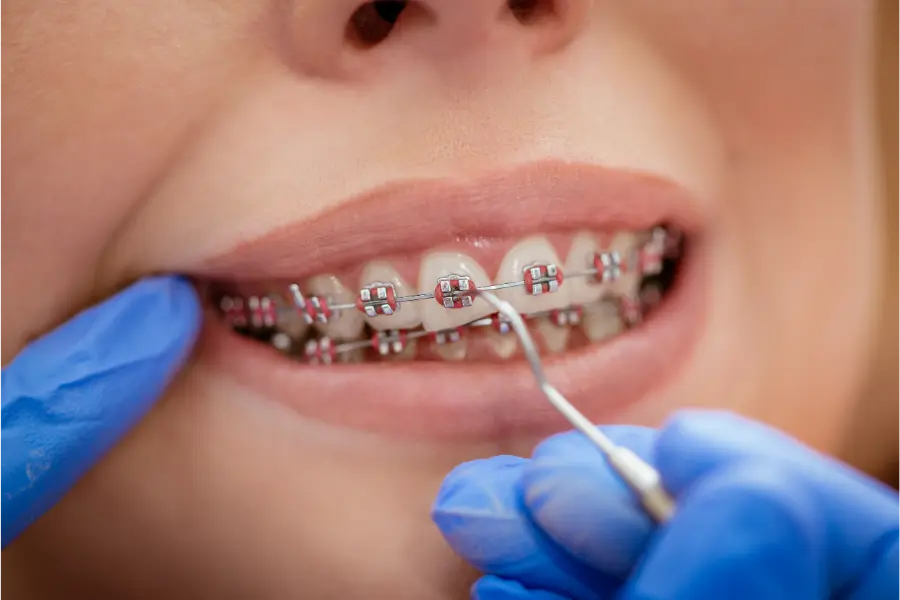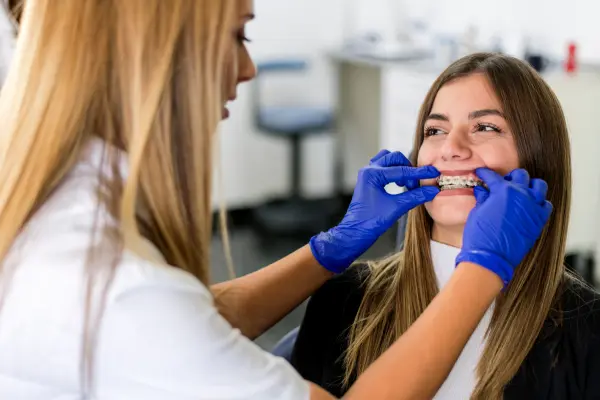
Table of contents
-
What to do when braces break?
-
How to Detect Whether the Braces are Broken
-
Risks And Side Effects Of Broken Braces
-
What should you do if your braces break?
If you’ve ever had a chance to look at the metal braces you’d realize how complicated they are! An army of specially designed parts collaborates day and night to give you a self-assured smile. Braces are solid, but they are not unbreakable. They might occasionally require some correction, just like your teeth.
When your teeth move, abrasions may happen in the soft tissue of your mouth, brackets may come loose, and wires may protrude. Thus, how would you respond in such a situation? Don’t worry, we've gathered all the information you want in this blog post regarding broken or dislocated braces, along with tips for navigating them, whether you're new to braces or far along in your treatment.
How to Detect Whether the Braces are Broken
If you suspect your braces are broken, there's a strong likelihood they might be. However, it’s important to note that not every ache or discomfort points to a break, particularly in the early phases of treatment.
Among the most frequent issues with braces, a few are:
- Missing or unsecured brackets
- Wires that are broken
- Severe pain or discomfort in the teeth
- Insecure dividers
- Loose bands
Risks And Side Effects Of Broken Braces
Serious risks might arise from broken cables and brackets. If neglected, they will lengthen the course of your treatment and raise your risk of infection.
Typical adverse effects consist of:
- Discomfort: When the wire pierces your mouth, it hurts.
- Cuts: Can result in oral infections and bleeding.
- Sores: Mouth sores can result from irritation of the tissues caused by a broken wire.
- Infection: Wounds and cuts from the broken braces may become infected.
What should you do if your braces break?
Although a damaged bracket or wire can be annoying, it's crucial to remain calm and take the appropriate action to resume your treatment. These are the steps you need to take if your braces break:
Step 1: Calm Down—This is Usually Not an Emergency
A confident smile can open doors in social settings. People with straighter teeth tend to feel more comfortable smiling in photos, engaging in conversations, and making new connections. Clear aligners, unlike traditional braces, are virtually invisible, allowing for uninhibited social interactions.
Enhanced Professional Success
A damaged bracket or wire is typically not a dental emergency. You might find it painful, but there's very little likelihood that it will pose a major risk to your dental health. Resist the need to panic and focus on managing the issue effectively.
Step 2: Evaluate the harm
Take a close look at your braces in a mirror. What to look for is as follows:
- Loose or Floating Bracket: The most frequent problem is a loose or floating bracket. The bracket may be attached to the wire even though it is partially separated from the tooth.
- Broken Bracket: The bracket may have entirely separated from the wire and the tooth.
- Bent Wire: The wire may be bent out of shape if you have been consuming tougher meals.
- Poking Wire: Your cheeks or gums may become irritated by a damaged or bent wire.
Step 3: Reduce the Pain
If a cut or sore is caused by a broken brace, you might experience discomfort. To obtain comfort, you can:
- Use sea salt water to rinse your mouth.
- Utilize over-the-counter drugs
- Employ a soft-bristled toothbrush.
- Avoid clear of acidic or spicy foods since they could aggravate the wound or irritation.
- Select soft meals and beverages.
Step 4: Take Steps to Reduce Discomfort
It's imperative to take immediate action to lessen discomfort and prevent consequences when braces fail.
Regarding Floating or Loose Brackets
In this case, orthodontic wax is your best buddy. To keep the bracket from rubbing on your cheek or gums, dab the bracket with a little wax.
For Brackets that Break
If the bracket comes off entirely, look for it and store it securely. It could be possible for your orthodontist to repair it.
For Poking or Bent Wires
When dealing with broken braces, use the following strategies to reduce discomfort.
- Gently Push the Wire: Carefully press the wire back into position on your tooth using a cotton swab or pencil eraser (make sure it's clean!).
- Orthodontic Wax: Your savior once more! To stop the projecting end of the wire from scraping your mouth, apply wax on it.
- Nail Clippers: You can use nail clippers to cut very long wires if they are extremely uncomfortable. This is a last-resort measure, though. To prevent more issues, it's preferable to let your orthodontist manage it.
Step 5: Make an Orthodontic Consultation Appointment
Take action now! No matter how bad the break is, get in touch with your orthodontist's office once to make an appointment. They can evaluate the circumstances, fix or replace any damaged components, and guarantee that your therapy continues as planned.

Step 6: Maintaining Your Braces Until Your Consultation
To maintain dental hygiene and comfort until professional aid is provided, it provides advice and temporary fixes for broken braces.
Maintain Good Oral Hygiene: To stop further issues, it's important to brush and floss regularly. Don't ignore the damaged region; instead, treat it gently.
Eat Only Soft Foods: Steer clear of chewy, sticky, or hard foods as they may irritate your mouth or damage your braces. Go for lighter options such as sautéed veggies, soups, and yogurt.
If you stay informed and take proactive steps, you may easily overcome any challenges that may arise throughout your orthodontic treatment. If you want to avoid these issues altogether, choose Aligner32’s clear aligner treatment.
FAQs
What should I do if a bracket comes loose from my braces?
Try to store a loose bracket carefully and make an appointment with your orthodontist straight away for repairs.
What should I do if the wire in my braces breaks?
If your wire breaks, wrap any jagged edges in orthodontic wax and get in touch with your orthodontist for guidance.
Can my braces be fixed at home if they break?
A damaged brace should never be attempted to be fixed at home because you could end up hurting yourself more. See your orthodontist for a consultation if you would like professional advice.
If a rubber band or elastic tie breaks, what should I do?
You should still notify your orthodontist even though you can usually wait until your subsequent appointment to have a broken rubber band or elastic tie fixed.
What should I do if a piece of my braces is uncomfortable poking me?
You can attempt applying orthodontic wax to conceal any protruding or uncomfortable parts of your braces while you wait for your orthodontist to provide you with more instructions.